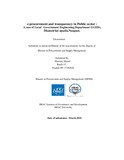| dc.contributor.advisor | Siddique, Mohammed Abu Bakar | |
| dc.contributor.author | Ahmed, Hussain | |
| dc.date.accessioned | 2018-06-03T04:24:43Z | |
| dc.date.available | 2018-06-03T04:24:43Z | |
| dc.date.copyright | 2018 | |
| dc.date.issued | 2018-02 | |
| dc.identifier.other | ID 17382026 | |
| dc.identifier.uri | http://hdl.handle.net/10361/10236 | |
| dc.description | This dissertation is submitted in partial fulfillment of the requirements for the degree of Masters in Procurement and Supply Management, 2018. | en_US |
| dc.description | Cataloged from PDF version of dissertation. | |
| dc.description | Includes bibliographical references (page 43-47). | |
| dc.description.abstract | Procurement is the acquisition of goods, services or works from an external sources and
performance of services by any contractual agreement. Public procurement means procurement
using public funds. Public sector organizations acquire goods, services and works from external
sources. Before 2003, public procurement process of Bangladesh was not standard neither to
fulfill donor agencies' expectation nor meet the country’s goal for ensuring transparency and
good governance. In this context, Government of Bangladesh, by replacing traditional public
procurement legal frameworks, enacted Public Procurement Act, 2006 with consultation of
World Bank and based on this Act Public Procurement Rules, 2008 were formulated. Despite of
comprehensive legal framework, tender box looting by the powerful bidder, corruption,
fraudulent, conspiracy and coercion were the common phenomena of manual public procurement
system in Bangladesh. These irregularities lead to reducing economic growth and lowering the
achievement of social objectives. In order to streamline the procurement process and address
mismanagement the public agencies, within the legal mandate drawn from PPA, 2006,
introduced electronic public procurement (e-GP). This study aims to evaluate the transparency
of e-GP in public procurement by examining the procurement process of Dhamoirhat LGED
office. For this purpose, a questionnaire survey has been conducted to gather primary data. Key
informant Interviews have been conducted to collect invaluable opinions of upazila engineer and
his team. Likely, a short-listed bidder of Dhamoirhat LGED office has been interviewed for
understanding their opinion about e-GP. It is found from the survey that e-GP is more transparent
than manual system in terms of bidding document submission. e-GP saves 50 per centper cent of
the procurement processing cost than manual system. e-GP promotes competition that naturally
reduces prices. Selection of eligible bidder is more transparent in e-GP than manual system.
Besides the benefits, a number of shortfalls have been identified: lack of infrastructure and
unskilled manpower. Recently World Bank has approved “Expand -e-GP project" which worth
$55 million for strengthening the country's public procurement. This project will help the
Implementation Monitoring and Evaluation Division (IMED) effectively monitor the execution
of annual development programs by establishing a single online platform connecting all public
sector organizations. | en_US |
| dc.description.statementofresponsibility | Hussain Ahmed | |
| dc.format.extent | 54 pages | |
| dc.language.iso | en | en_US |
| dc.publisher | BRAC Univeristy | en_US |
| dc.rights | BRAC University dissertations are protected by copyright. They may be viewed from this source for any purpose, but reproduction or distribution in any format is prohibited without written permission. | |
| dc.subject | LGED | en_US |
| dc.subject | E-procurement | en_US |
| dc.subject | Public procurement | en_US |
| dc.title | e-procurement and transparency in public sector : a case of Local Government Engineering Department (LGED), Dhamoirhat upazila,Naogaon. | en_US |
| dc.type | Dissertation | en_US |
| dc.contributor.department | BRAC Institute of Governance and Development, BRAC University | |
| dc.description.degree | M. Procurement and Supply Management | |

